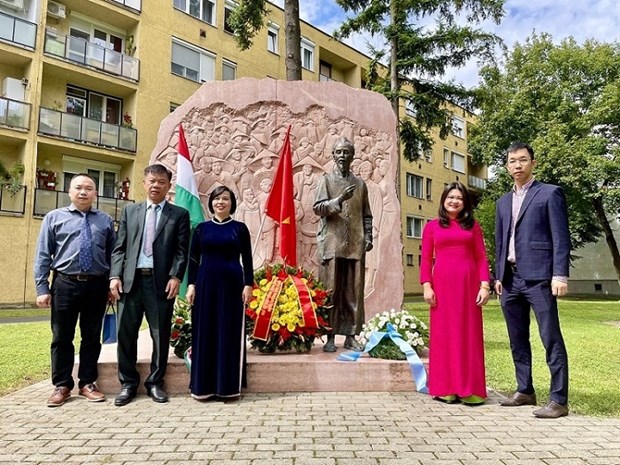Uncle Ho's monument is treasured by Hungarian friends who love Vietnam, becoming a symbol of the strong friendship between the two peoples of Vietnam and Hungary.
The statue of President Ho Chi Minh has been respectfully preserved by Hungarians who have fond sentiments for Vietnam, becoming a symbol of the close friendship between the peoples of Vietnam and Hungary.
To celebrate the Independence Day of Vietnam (September 2) and the Independence Day of Hungary (August 20), Ambassador of Vietnam to Hungary Nguyen Thi Bich Thao and other staff members of the embassy recently visited and offered commemorative flowers at the statue of President Ho Chi Minh in Zalaegerszeg to show their respect to the father figure of the people of Vietnam, reported Vietnamtimes.

Ambassador Nguyen Thi Bich Thao and staff of the Vietnamese Embassy in Hungary
offered flowers at the monument of President Ho Chi Minh in the city of Zalaegerszeg (Hungary).
(Source: The World and Vietnam)
Many politicians and people in Hungary hold respect and admiration for President Ho Chi Minh, a hero of the people of Vietnam who dedicated his life fighting for peace, independence and freedom.
Renowned Hungarian sculptor Marton László (1925-2008) showcased these sentiments by carving a statue of Uncle Ho.
Located in Zalaegerszeg, the administrative center of the western Zala county lying 220 kilometers from Budapest, László’s statue was inaugurated on the 1st anniversary of the unification of Vietnam (April 30, 1976).
The statue of President Ho Chi Minh has been respectfully preserved by Hungarians who have fond sentiments for Vietnam, becoming a symbol of the close friendship between the peoples of Vietnam and Hungary.
The Embassy of Vietnam to Hungary, Hungary – Vietnam Friendship Association and the communications committee of the Veterans Association of Vietnam in Hungary also visited the National Military Memorial Park in Pakozd, a city located 50 kilometers northeast of Budapest. The delegates paid tribute to the Hungarian soldiers who have fought for peace by offering flowers at the monument dedicating to soldiers participating in peacekeeping missions, including those who joined the international missions to monitor the ceasefire agreement in Vietnam.
Colonel István Görög, Director of the memorial park, introduced to the visitors the major milestones in the history of peacekeeping of the Hungarian army, underlining that the materials and exhibitions held at the park were aimed at helping Hungarian youths to understand the importance of peace, independence, freedom and the meaning of peacekeeping missions.
The Hungarian veterans who joined the International Commission of Control and Supervision to supervise the ceasefire and report on the implementation of the Paris Peace Accords in the period 1973 – 1975 are now the core members of Hungary – Vietnam Friendship Association.
Vice-president of the Hungary – Vietnam Friendship Association Colonel Gyula Nagy noted that Hungary had joined peacekeeping missions in 19 countries. Vietnam was one of the first countries Hungarian troops were sent to. Unlike the peacekeeping missions in other countries, the mission in Vietnam held a special meaning to the Hungarian troops as they also contributed to peacemaking.
Seeing the stone steles preserving memories about peacekeeping missions in Vietnam and other items showing at the park’s museum brought back to Hungary from Vietnam by Hungarian war veterans, Ambassador Thao expressed her appreciation for the warm feelings and meaningful support that the government and people of Hungary, especially Hungarian war veterans, gave to Vietnam during the Vietnam War.
The ambassador was elated that Hungarian war veterans and members of the Hungary – Vietnam Friendship Association continued to be the bridge that enhanced the mutual understanding and support between the peoples of Vietnam and Hungary./.